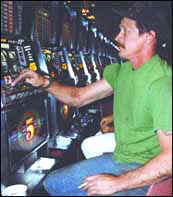|
March 16, 2000
By Jim Mimiaga Gambling has been good for the combined economies of the Ute Mountain Tribe and Montezuma County, according to a study released in January. The Ute Mountain Casino in Towaoc benefits the region beyond just the immediate profits, jobs and tourism that it provides for the reservation community, the report reveals. Ripple effects caused by visitors spending money on hotels, food, recreation and gas outside the limited stakes casino have contributed nearly $9 million in annual revenues to the county economy in the last five years, according to the report. For Cortez, the indirect benefits of the casino over the past five years were estimated to be between $7 and $8 million, the report said. Projects funded as a result of gaming revenue, according to the study, include lighted streets, new baseball fields, and sidewalks. "For us [gambling] has meant more equipment and services for the community," said Norman Lopez, editor of Weminuche Smoke Signals, the tribeís monthly newspaper. "It is helping to better our living conditions by making possible better roads, recreation and lifestyle improvements." Laura Brown, the tribeís senior citizen program director, echoed that without the revenues derived from the casino, some of her programs would not be possible. "For instance, those funds go to programs that help out elders on fixed incomes who need, but canít afford to replace when they break, necessities like water heaters," she said. The impact study on the recently expanded casino, now in its ninth year, was commissioned by the tribe, county, and the Colorado Division of Gaming. Gambling tourists also contribute to the local tax base. While the tribe is exempted from direct sales and business taxes, the crowds it attracts provide a good chunk of public monies. The Ute Mountain Casino operation has been responsible for generating an annual average of between $565,000 and $645,000 of tax revenues in Colorado over the last five years, the report said. For Cortez, the facility generated an annual average of between $85,000 and $125,000 since 1994. And for the federal government, the report says, the casino has contributed $1.5 million in additional taxes. Wild predictions that the casino would cause crime to skyrocket in the county and overburden the small police force on the reservation have proved to be unfounded, tribal officials say. Ute Mountain Police Chief Dusty Whiting said that the casino has not caused significant problems for his department. For the month of January, the Ute Mountain police responded to 361 calls, with 24 occurring near the casino, mostly for intoxicated individuals. He said that casino calls make up around seven percent of the departmentís total calls, or 280 per year. The dry reservation makes it a criminal act to possess liquor, consume it, or become intoxicated on tribal lands. "It is considerably less than what I expected when I arrived (a year ago)," he said. "From talking with people in the community, any trouble they had at the beginning has tapered off. "I think that people over time have figured out that they are not welcome at the casino if intoxicated. The community looks at it as sober entertainment." Whiting said that it was difficult to determine whether or not traffic has increased because of the casino, since U.S. Highway 160/666 has always been a major thoroughfare. Gambling a tradition game for Mountain Utes By Jim Mimiaga The Ute Mountain Casino in Towaoc has not caused a increase in gambling-addiction problems, as some had feared. "I though it would be a big complaint, but we have not seen those problems," said Norman Lopez, the editor of the tribeís newspaper. "Historically the Utes have gambled." The long history of gambling within Ute culture centers around a game of chance called "hands." "It is played with a series sticks that are passed back and forth between a group of people," Lopez explained. "The elders would stay up for hours playing this game, and card games also, so the introduction of the casino was not a major change." Hand-game competitions take place within the tribe about once a year and national events are held frequently, he said. "Bets are made and it can get very lively, with lots of singing," Lopez said. "Once learned, everyone wants to play; it is a very enjoyable game that has been with us for many years. Now it has turned more into a monetary thing with the casino." Indian peopleís penchant for sharing results in their winnings being distributed among friends and families in a revolving cycle, he said. But Lopez said that casinos are not for every tribe. The Navajos, for instance, have voted against starting up a casino several times because it violates their religious beliefs and is considered a bad omen. "For some it may cause problems if they use gambling to relieve stress," Lopez said. "It builds up hope until there is no more money to gamble, and then what?" |
||
|
Copyright © 2000 the Cortez
Journal. All rights reserved. |
